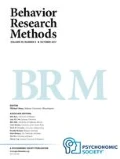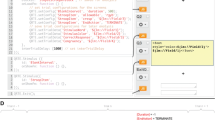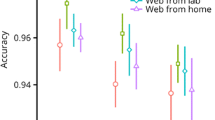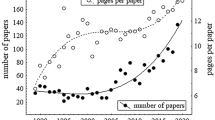Abstract
Since the publication of Plant, Hammond, and Turner (2004), which highlighted a pressing need for researchers to pay more attention to sources of error in computer-based experiments, the landscape has undoubtedly changed, but not necessarily for the better. Readily available hardware has improved in terms of raw speed; multicore processors abound; graphics cards now have hundreds of megabytes of RAM; main memory is measured in gigabytes; drive space is measured in terabytes; ever larger thin film transistor displays capable of single-digit response times, together with newer Digital Light Processing multimedia projectors, enable much greater graphic complexity; and new 64-bit operating systems, such as Microsoft Vista, are now commonplace. However, have millisecond-accurate presentation and response timing improved, and will they ever be available in commodity computers and peripherals? In the present article, we used a Black Box ToolKit to measure the variability in timing characteristics of hardware used commonly in psychological research.
Similar content being viewed by others
References
Accuracy versus precision, the target analogy (n.d.). Retrieved March 31, 2008, from Wikipedia: http://en.wikipedia.org/wiki/accuracy_and_precision#accuracy_versus_precision.3B_the_target_analogy.
Beringer, J. (1992). Timing accuracy of mouse response registration on the IBM microcomputer family. Behavior Research Methods, Instruments, & Computers, 24, 486–490.
Krantz, J. H. (2000). Tell me, what did you see? The stimulus on computers. Behavior Research Methods, Instruments, & Computers, 32, 221–229.
Plant, R. R., Hammond, N., & Turner, G. (2004). Self-validating presentation and response timing in cognitive paradigms: How and why? Behavior Research Methods, Instruments, & Computers, 36, 291–303.
Plant, R. R., Hammond, N., & Whitehouse, T. (2002). Toward an experimental timing standards lab: Benchmarking precision in the real world. Behavior Research Methods, Instruments, & Computers, 34, 218–226.
Plant, R. R., Hammond, N., & Whitehouse, T. (2003). How choice of mouse may affect response timing in psychological studies. Behavior Research Methods, Instruments, & Computers, 35, 276–284.
Russinovich, M. (2007, August 27). Vista Multimedia playback and network throughput. Article posted to http://blogs.technet.com/markrussinovich/archive/2007/08/27/1833290.aspx
Schmidt, W. C. (2001). Presentation accuracy of Web animation methods. Behavior Research Methods, Instruments, & Computers, 33, 187–200.
Ulrich, R., & Giray, M. (1989). Time resolution of clocks: Effects on reaction time measurement: Good news for bad clocks. British Journal of Mathematical & Statistical Psychology, 42, 1–12.
White, N. (2007, October 29). An overview of Windows sound and music ‘glitching’ issues. Article posted to http://windowsvistablog.com/blogs/windowsvista/archive/2007/10/29/an-overview-of-windows-sound-and-music-glitching-issues.aspx.
Author information
Authors and Affiliations
Corresponding author
Additional information
This research was first presented during a symposium at the Society for Computers in Psychology (SCiP) conference, Long Beach, CA, November 15, 2007.
Rights and permissions
About this article
Cite this article
Plant, R.R., Turner, G. Millisecond precision psychological research in a world of commodity computers: New hardware, new problems?. Behavior Research Methods 41, 598–614 (2009). https://doi.org/10.3758/BRM.41.3.598
Received:
Accepted:
Published:
Issue Date:
DOI: https://doi.org/10.3758/BRM.41.3.598




